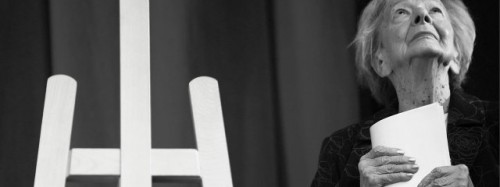
In the 1960s, as I was embarking on the career of a poet, I brought my poetry to [the Krakow weekly] “Życie Literackie” (what an emotional moment!). Wisława Szymborska was in charge of the poetry section. Following a second visit she accepted one of my poems for print. Later, when we got to know each other well and I reminded her of this story, she’d say: Adam, I don’t remember it. In the 1970s I was already a regular at her famous dinners. The conversation was never “literary”. Poetry was discussed least of all but that came in a later era, and Wisława would suddenly announce: you know, I don’t know about you but I’ve had enough of Dostoyevsky. Or: poetry critics never read any books on natural science or nature, how can they understand any contemporary poetry? When she was the hostess, she made sure not just to feed her guests well but also to look after the quality of the conversation. Sometime I had the impression she had prepared for these conversations to some extent, suggesting a topic she found interesting so that the conversation wouldn’t slide into ordinary chatter. I think that one of her greatest foes, apart from the two greatest – totalitarian ideology and political crime – was boredom. Boredom and banality. There was nothing bohemian about her, she didn’t dye her hair green, but she couldn’t stand banality. She didn’t write banal poetry and also in the art of living she always endeavoured to make it more interesting, intelligent, to get people who met in the evenings to discuss serious issues. Her famous raffles, in which every guest would get a ticket and win (for everyone would win something) some bizarre object, were actually invasions of surrealism: the gifts were surrealist, they were completely useless, and yet her guests would eye each other with envy if someone happened to receive a masterpiece of absurdity. It might have been a huge picture, total kitsch, or a glass with a tiny glass mouse – a gentle allusion to delirium tremens. Sometime it seemed she had just popped in from a 18th century Paris salon for a moment. As we know, it was the women who played the first fiddle in these salons. Wisława appreciated enlightenment and reason and in our culture imbued with the fever of romanticism she represented different values, different temperatures. There was a grace about her, about her gestures, movements, her words and her poetry. She valued form; I think she could not stand chaos. And her perfect sense of humour also had a touch of enlightenment in it. The Right, as we know, has reproached her, quite brutally at times, for a brief period of loyalty to socialist realism. In this kind of issues what matters more is how one gets out of this impasse, not how one got into it. Any one of us can make a mistake, especially when we’re very young. And Wisława Szymborska found a brilliant way of leaving her mistake behind. The echo of that mistake has never stopped ringing in her later work. She was a person and a writer who longed for the truth and intellectual honesty and the fact that she had erred in her younger days had been not just a lesson to her but a source of great knowledge. She had built her mature work on a reflection of those years, of that poetry that she never wanted to see reprinted. And that is certainly much more interesting and instructive for us than Wisława Szymborska in the early 1950s. She was herself as almost no-one else. What I mean is that both in her poetry and in life she was absolutely herself, Wisławą Szymborską, almost without any other ingredients. Her poetry is original against the background of the entire world poetry: it is a poetry that is intellectual, focused but also witty, ironic and, surprisingly accessible. There is no other poet like that. She became immensely popular in several, if not several dozen, countries. She drew huge crowds in Italy. She never visited other countries, so we can’t tell it the same would have been the case but the huge print runs of her books in the US, for instance, seem to confirm it. She turned down invitations, making her faithful secretary Michał Rusinek reply: “I will come as soon as I get younger. The fact that she never did come made her into a legend. Directors of large institutions, lecture halls, university professors would sigh sadly. But we in Poland were luckier. She was a kind person, extraordinarily attentive to those she loved. She was modest and charming. I don’t have to say: I will never forget Wisława Szymborska”, for she was someone you don’t forget. She was unforgettable, in her poetry and in conversation. Even in photographs. For nobody could look into the camera the way she did, in this slightly playful, intelligent, confident way. A person to whose hand a Waterman gave marvellous wings, as she said in a poem about Tomas Mann.

